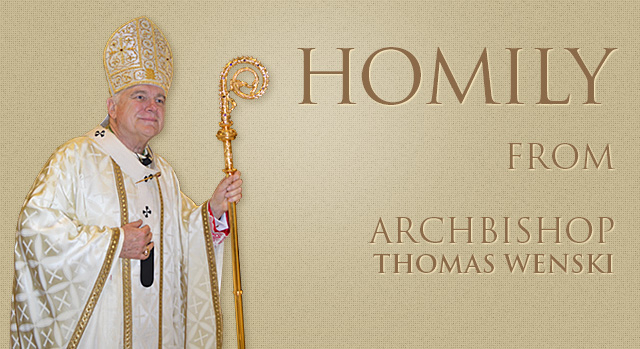By Archbishop Thomas Wenski - The Archdiocese of Miami
Homily by Archbishop Thomas Wenski at St. Brendan High School with students and faculty at Mass for the dedication of the school's new building. September 26, 2016.
In the gospel, the disciples are talking with each other about who among them is the greatest. We do the same thing, don’t we? I guess it is part of our DNA – everybody wants to be a “somebody” rather than a “nobody”, a winner and not a loser. Your parents, your teachers want you to study hard so that you can be “somebody”, right? But the question is what makes anybody into a somebody? What does it mean to be great?
To the question who is the greatest? Jesus answers, “The one who is least among you.” And he took a little child and place the child at his side. Now, at the time when Jesus lived, children did not enjoy the status that we accord them today. Today parents love to spoil their kids. If you don’t think so just remember all that stuff they buy for you. In Jesus’ time, most of his contemporaries followed the axiom, “spare the rod and spoil the child”. And back then, there was no DCF that would investigate parents if they used the rod too generously.
Yet, Jesus put that little child before them and said, "“Whoever receives this child in my name receives me, and whoever receives me receives the one who sent me. For the one who is least among all of you is the one who is the greatest.”.” What does this mean? If it was about accepting someone who is easy to accept, he would not have had to say this – and so, this verse is also about accepting the hard to accept person. A little child is dependent, he or she requires care. Kids can create a burden, they are certainly great responsibilities – if you have little brothers or sisters you might understand this.
How do we make room in our lives for those hard to accept people, unless we are humble? How do we bear with one another’s burdens, unless we are humble? “For the one who is least among all of you is the one who is the greatest.” Only if we know of our own “littleness” under the mercy of God are we able to see others as people who are also under the mercy of God. To reject the other because he or she is annoying, because he or she is in no position to help us, because he or she is unimportant, at least in ways that the world evaluates what is important, is to reject Christ himself.
Christ humbled himself – he was God yet became a little child; Christ humbled himself – he was innocent and without sin yet he suffered and died on the cross for sinners.
In this gospel passage, Jesus is trying to make an important point – and drives it home with this example. He wants to remind us that the way things are valued in this world is not how they are valued in his kingdom. We do want to feel important, and we want to feel valued – and that’s why drives most of us to succeed in school and in our workplaces. We live in a very competitive society: it is dog eat dog out there; and to succeed, it seems that we have to be the meanest dog. The world tells us, nice guys finish last.
Jesus tells us something different. Yes, it’s good to be important; but it’s more important to be good.
Now that child at Jesus’s side most likely was not interested in the question, who is greatest. He was not seeking any rewards or making any claims for following Jesus. And here is the lesson that Jesus wanted to give: unless we can be satisfied with just being in God’s mercy and under God’s rule, we cannot say that we are like little children. If we have thoughts of wanting to make demands from God and from others for expected rewards for what we have done, we cannot say we are like little children.
Who is the greatest in God's kingdom? The one who is humble and lowly of heart — who instead of asserting their rights willingly empty themselves of pride and self-seeking glory by taking the lowly position of a servant or child.
Jesus, himself, is our model. He came not to be served, but to serve (Matthew 20:28). Paul the Apostles states that Jesus emptied himself and took the form of a servant (Phil. 2:7). Jesus lowered himself (he whose place is at the right hand of God the Father) and took on our lowly nature that he might raise us up and clothe us in his divine nature.
If we want to be filled with God's life and power, then we need to empty ourselves of everything which stands in the way — pride, self-seeking glory, vanity, etc. God wants empty vessels so he can fill them with his own glory, power, and love. Are you ready to humble yourself and to serve as Jesus did? Last year about this time, Pope Francis visited Cuba and the United States. In Cuba, he said. El que no vive para servir, no sirve para vivir. In God’s eyes, the real somebodies, the real winners are those who make themselves the least, because they are out to serve others and not merely out to serve themselves.

